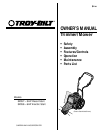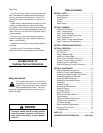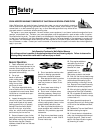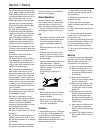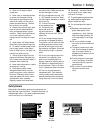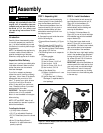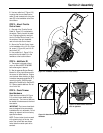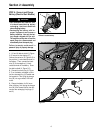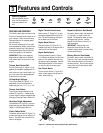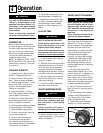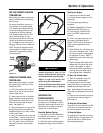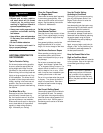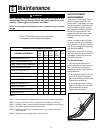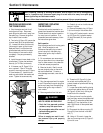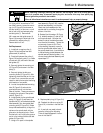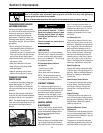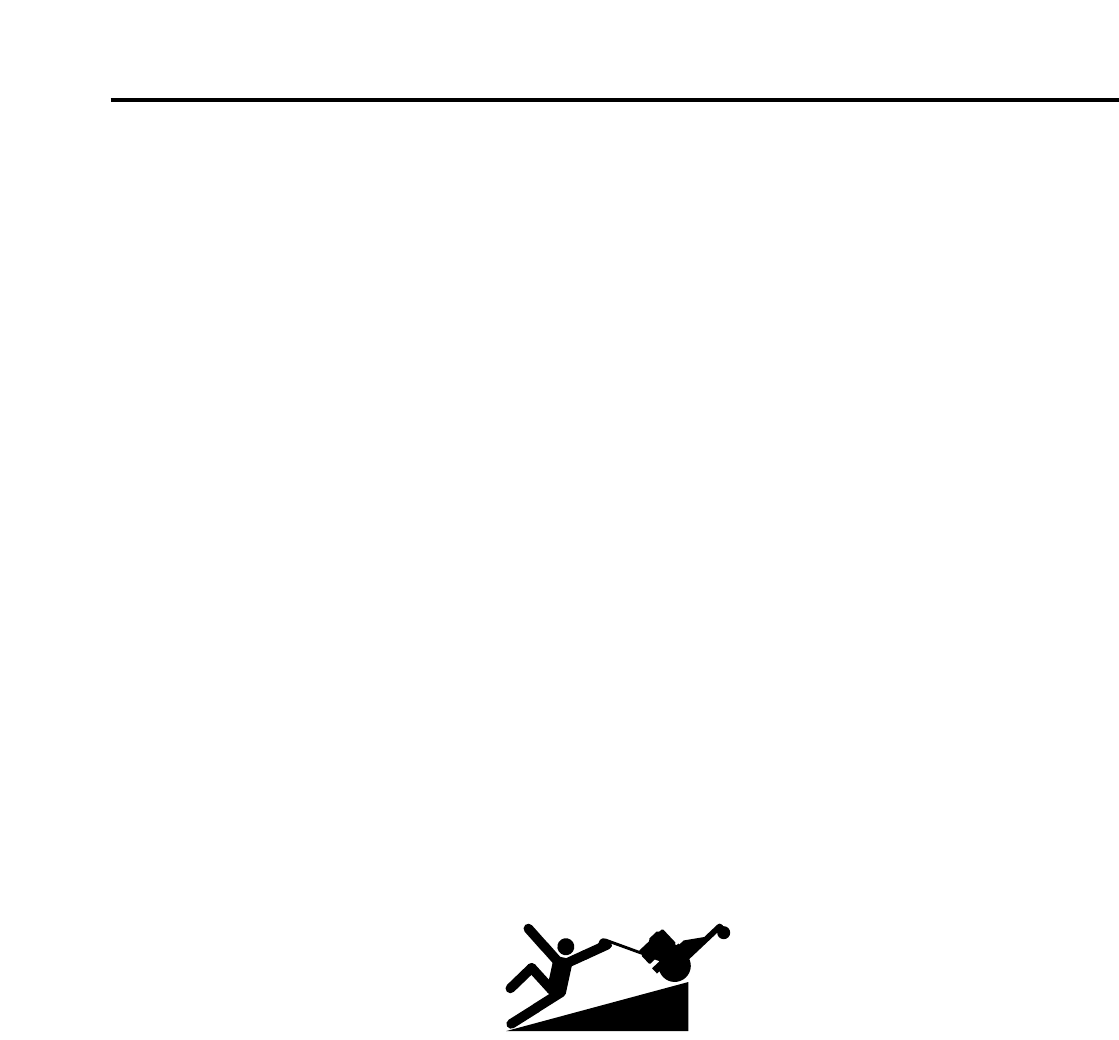
2
Section 1: Safety
20. Always wear approved safety gog-
gles or safety glasses with side shields
when operating equipment. The use of
any powered machine can result in for-
eign objects being thrown by high-
speed rotating parts which can cause
personal injury or property damage.
Stay away from glass and other easily
thrown or breakable objects.
21. Wear work gloves and sturdy
footwear when using this equipment.
Leather work shoes or short boots are
ideal. They protect ankles and shins
from rocks, pebbles, splinters, etc.
22. It is advisable to wear protective
headgear to prevent the possibility of
being hit by small flying particles, etc.
23. Before each use, inspect the Throt-
tle Control Lever and cable. Make sure
the cable is free and the lever functions
properly.
24. Watch for traffic when near or
when crossing roadways.
25. Never attempt to carry children or
other passengers on the equipment.
They could fall off and be seriously in-
jured, or they could interfere with safe
operation of the equipment.
26. The machine is equipped with a
plastic debris shield in front of the
engine and a rubber debris flap under
the frame. They must be in place and
working properly. Never remove or
cause the debris shield or debris flap to
cease working. If either of these parts
is missing or not working properly, do
not use the equipment until this situa-
tion is corrected.
27. Be aware of where the machine is
discharging materials and do not point
the discharge at anyone.
28. Never run the engine in an en-
closed area. Engine exhaust contains
carbon monoxide, a deadly gas that is
odorless, colorless and tasteless.
Always run the engine outdoors where
there is adequate ventilation.
29. Slow down before turning.
30. Shut off engine when not trimming
or mowing.
31. Use extra care when loading or un-
loading machine into a trailer or truck.
32. Use this equipment for its intended
purpose only.
33. Always make sure the handlebars
are tight and comfortably positioned.
They should never be in an awkward
position for the operator.
Slope Operation
Slopes are a major factor related to
loss of control and tip-over accidents
which can result in severe injury or
death. All slopes require extra caution.
If you can not back up the slope or you
feel uneasy on a slope, do not mow it.
DO:
Mow across the face of slopes; never
up and down. Exercise extreme cau-
tion when changing direction on
slopes. Avoid slopes greater than
15
o
.
Remove objects such as rocks, tree
limbs, etc.
Uneven terrain could overturn the
machine. Watch for holes, ruts, or
bumps. Tall grass can hide obstacles.
Use slow speed.
Use extra care with grass catchers or
other attachments. These can
change the stability of the machine.
Keep all movement on the slopes
slow and gradual.
Avoid starting or stopping on a
slope.
DO NOT:
Do not mow near drop-offs, ditches,
or embankments. You could lose
footing or balance.
Do not mow on very steep slopes.
Do not mow on wet grass. Slippery
footing can be hazardous.
Children
Tragic accidents can occur if the opera-
tor is not alert to the presence of chil-
dren. Children are often attracted to the
machine and the mowing activity.
Never assume that children will remain
where you last saw them.
1. Keep children out of the mowing
area and under the watchful care of a
responsible adult.
2. Be alert and turn machine off if chil-
dren enter the area.
3. Before and while moving back-
wards, look behind and down for small
children.
4. Never allow children to operate the
machine.
5. Use extra care near blind corners,
shrubs, trees, or other objects that
may obscure vision.
6. Never carry children, even with the
trimmer head stopped. Children may
fall off and be seriously injured or in-
terfere with safe machine operation.
7. Do not allow children nearby if you
are working.
Service
1. Use extra care in handling gasoline
and other fuels. They are flammable
and their vapors are explosive. To
help prevent a fire or explosion:
a) Use only an approved container.
b) Never remove gas cap or add
fuel when the engine is running.
Let engine cool before refueling.
Do not smoke.
c) Never refuel the machine in-
doors. Fill the fuel tank outdoors
and with extreme care.
d) Never store the machine or fuel
container inside where there is
an open flame, such as a water
heater, etc.
e) Replace caps on the fuel tank
and fuel container and clean up
spilled fuel before starting en-
gine. Move machine away from
any gasoline fumes before start-
ing the engine.
f) Keep matches, smoking materi-
als, open flames, and sparks
away from the fuel tank and fuel
container.
g) Leave 1/2" air space at the top of
the fuel tank to allow for fuel ex-
pansion.



